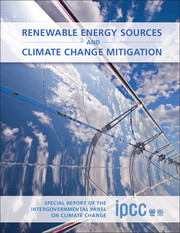 Renewable Energy Sources and Climate Change Mitigation
Renewable Energy Sources and Climate Change Mitigation Technical Summary
Published online by Cambridge University Press: 05 December 2011
Summary
Overview of Climate Change and Renewable Energy
Background
All societies require energy services to meet basic human needs (e.g., lighting, cooking, space comfort, mobility, communication) and to serve productive processes. For development to be sustainable, delivery of energy services needs to be secure and have low environmental impacts. Sustainable social and economic development requires assured and affordable access to the energy resources necessary to provide essential and sustainable energy services. This may mean the application of different strategies at different stages of economic development. To be environmentally benign, energy services must be provided with low environmental impacts and low greenhouse gas (GHG) emissions. However, the IPCC Fourth Assessment Report (AR4) reported that fossil fuels provided 85% of the total primary energy in 2004, which is the same value as in 2008. Furthermore, the combustion of fossil fuels accounted for 56.6% of all anthropogenic GHG emissions (CO2eq) in 2004. [1.1.1, 9.2.1, 9.3.2, 9.6, 11.3]
Renewable energy (RE) sources play a role in providing energy services in a sustainable manner and, in particular, in mitigating climate change. This Special Report on Renewable Energy Sources and Climate Change Mitigation explores the current contribution and potential of RE sources to provide energy services for a sustainable social and economic development path. It includes assessments of available RE resources and technologies, costs and co-benefits, barriers to up-scaling and integration requirements, future scenarios and policy options.
Information
- Type
- Chapter
- Information
- Renewable Energy Sources and Climate Change MitigationSpecial Report of the Intergovernmental Panel on Climate Change, pp. 27 - 158Publisher: Cambridge University PressPrint publication year: 2011